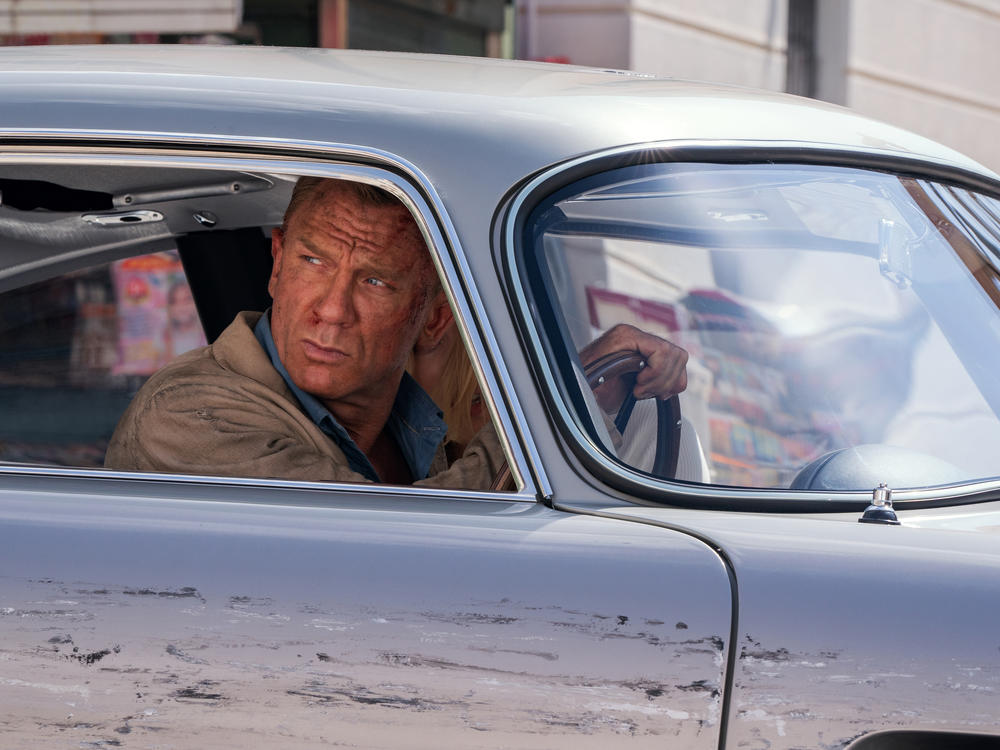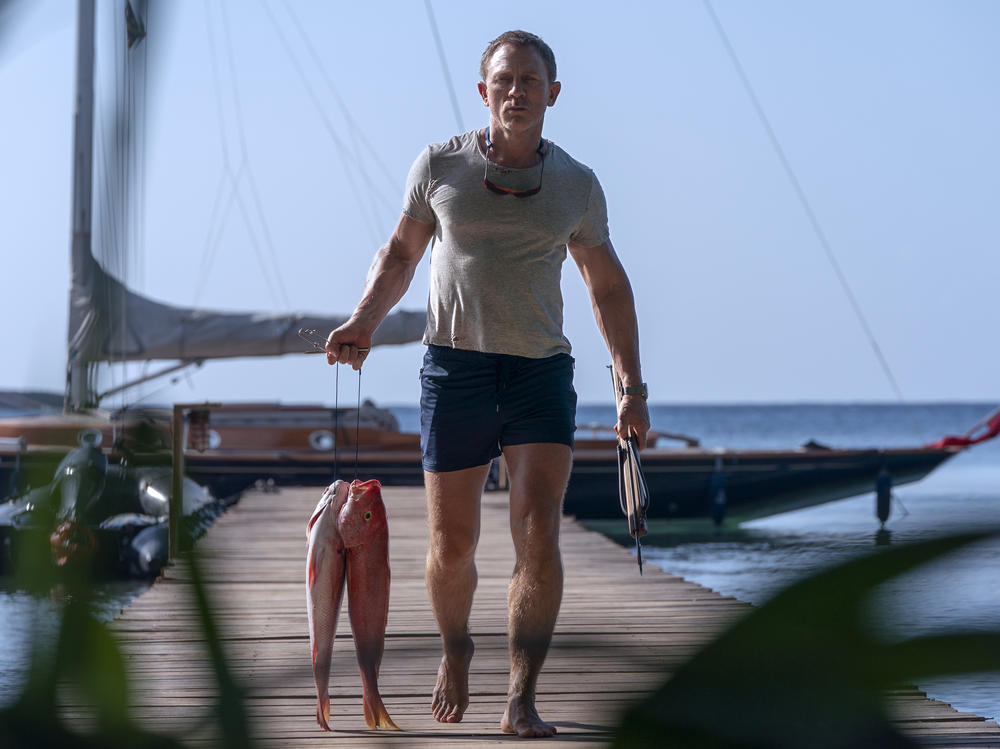Section Branding
Header Content
James Bond has all those gadgets but no hand sanitizer. Avoid these 007 travel habits
Primary Content
Though his latest exploits involve outwitting a villain armed with a deadly virus in No Time To Die, James Bond is hardly known for promoting public health practices.
From his questionable sexual behavior to his unsafe eating habits to his risk-taking with regard to insect- and animal-borne diseases, it's remarkable that the famous fictional secret agent has repeatedly lived another day.
In a new paper, published in the journal Travel Medicine and Infectious Diseases, researchers report numerous examples of 007's shaky approach to travel health and safety throughout 25 films produced by Eon Films from 1962 to 2021.
With many COVID-related international travel restrictions ending, the researchers' findings could provide helpful reminders to would-be adventurers about what not to do if you're contemplating a far-off trip or even a domestic one.
All three authors are malaria experts who, like Bond, travel frequently to remote destinations. "We are always cautious to not contract tropical diseases. And we often fail, despite taking precautions ... We wondered how James Bond manages to stay healthy," says co-author Teun Bousema, a researcher at Radboud University Medical Center, Nijmegen, the Netherlands.
Research on the paper, titled No Time to Die: An in-depth analysis of James Bond's exposure to infectious agents entailed approximately "3113 min of evening hours per author that could easily have been spent on more pressing societal issues," the authors note.
They analyzed a total of 86 international journeys, involving trips to 47 countries.
Bond's seeming imperviousness to infectious disease is perhaps not surprising, given his ability to regularly survive all kinds of potentially lethal threats. But, while Bond's situations are fairly extreme, the authors point out that travel-related distractions are the norm.
"The serious message is that we often think of ourselves as invulnerable when traveling. The holiday mood or excitement makes us feel nothing can happen. That is not the case and we run real risks," Bousema says.
Bond's sketchy sexual exploits merit first mention as one of his "more obvious risk factors for infectious disease exposure during work travel." Typically, the authors note, Bond's relationships with women are "brief, with little time for a healthy exchange of sexual history," and little to suggest that he uses condoms. Moreover, the authors observe that 27.1% of Bond's sexual partners die at some point in the film, although not necessarily due to the unsafe sexual behavior.
While Bond himself escapes unscathed, don't get any ideas, Bousema says: "Many sexually transmitted infections are on the rise among young people and especially during travel many people have casual sexual encounters, often unprotected."
Bond also manages to survive some shockingly neglectful hand hygiene and food safety practices, causing the researchers to term him "the man with the golden gut." In one trip to the Louisiana Bayou in Live and Let Die, he doesn't wash his hands after handling raw chicken, thereby risking bacterial infections including Campylobacter, Salmonella, or Clostridium. He also "repeatedly risks vibriosis, norovirus, and hepatitis infection by eating uncooked oysters."
All of these largely preventable infections can lead to acute and sometimes severe diarrhea, which would have put a crimp in Bond's typically compressed world-saving agenda. They're also the most common cause of travel-associated health problems in the real world.
"Being careful about what one eats and washing hands can prevent a lot of discomfort and sometimes also dangerous situations," Bousema cautions.
007 also fails when it comes to "taking even the most basic of precautions" against diseases caused by insect bites, such as malaria, dengue, and chikungunya, which are endemic in several of his travel destinations including the Bahamas, Jamaica, and India, respectively. And, he sometimes falls for medical misinformation, such as using salt water to fend off mosquitos, when in fact insecticides such as diethyltoluamide (DEET) are a better bet.
Here, Bousema gives quantum advice. "Vector borne diseases are on the rise and the risk can really be reduced substantially with good precautions. Prevent mosquito bites, be careful with ticks!"
Bond's carefree interactions with potentially disease-bearing creatures such as rats, cats, snakes, and aggressive and potentially rabid dogs, also raise worries. The authors speculate that brain changes due to toxoplasmosis, a disease from parasites found in animal feces, "might explain Bond's often foolhardy courage in the face of life-threatening danger."
Even the most recent Bond film, No Time to Die, was filmed pre-COVID-19 (although it features remarkably prescient elements). Nonetheless, investigators still fault Bond for his lack of droplet precautions given that the 1957-58 H2N2 influenza pandemic had taken place less than a decade before the earliest Bond films. While Bond does occasionally wear facemasks for various reasons, in one instance he actually puts on one that had recently been used by another person.
"COVID-19 has shown us how fast respiratory infections can spread and the important role of travel in this spread. Being cautious, also after the pandemic, remains important. This will continue to include avoiding crowds or close encounters when symptomatic of any pathogen, known or unknown," Bousema says.
Bousema speculates that Bond would likely have had some difficulty handling COVID-19 restrictions. "He enjoys the crowds, busy casinos and social events. He will have struggled there, and I do see major challenges for him working from home. It is just not in his DNA."
But, Bond might accept the COVID vaccine. "He has been observed being injected with a microchip in the movie Casino Royale. In that sense, the conspiracy theories about being traceable after COVID vaccinations may actually have convinced him to get his shots," Bousema jokes.
The paper also lists several other risky Bond behaviors, such as diving without taking precautions against decompression sickness, risking dehydration by drinking alcohol while engaging in extreme activities in warm climates, and never being seen applying sunscreen despite spending plenty of time in sunshine. The authors do, however, give him credit for often wearing sunglasses.
The health risks from Bonds' excessive smoking and drinking habits have actually been studied by other investigators and published in medical journals, including one reported by NPR in 2013. The current study is the first to comprehensively review Bond's occupational exposure to infectious disease. And the researchers are worried: "Given the limited time Bond receives to prepare for missions, we urgently ask his employer MI6 to take its responsibility seriously," they write.
Ultimately, Bousema says, though it may be too late for Bond, other world travelers can learn from his many near misses: "Think about health risks and prepare your travel and hygiene during travel. Preparation is everything."
After all, as the study authors note, we only live once.
Copyright 2021 NPR. To see more, visit https://www.npr.org.



